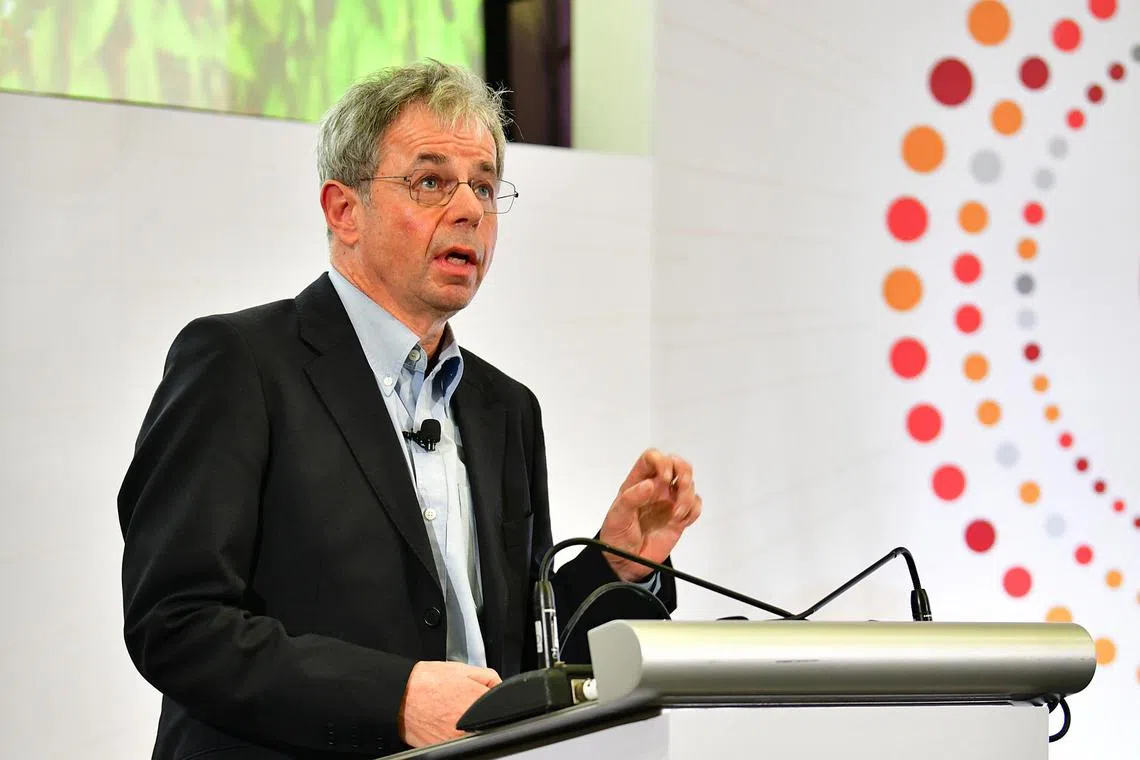Get used to failure, says scientist who revolutionised genome sequencing
Sign up now: Get ST's newsletters delivered to your inbox

Though he is now well decorated with awards, Professor David Klenerman said he had gone through the circle of failure multiple times.
PHOTO: NRF SINGAPORE
SINGAPORE - Scientists should get used to their experiments failing, said Professor David Klenerman, a prolific researcher who revolutionised genome sequencing around the world.
Speaking to participants at the Global Young Scientists Summit last week at the Singapore University of Technology and Design in Changi, he said: “You’re doing something that no one else has done before, so by definition, you’re going to come up with problems.”
Prof Klenerman, a faculty member of the University of Cambridge, was speaking from experience. Before he discovered how to quickly and economically determine the genetic make-up of organisms in 1997, he was attempting to observe how DNA was assembled by enzymes known as polymerase.
However, Prof Klenerman said his team “did not manage to get this experiment to work very well”. Consequently, he went to a pub in Cambridge with Professor Shankar Balasubramanian, one of his colleagues, to discuss their research problems.
As a result, the two men worked out a fundamentally new way to read DNA. Known as Solexa sequencing – after the company they founded in 1998 to scale the technology – the technique first breaks apart a DNA strand before replicating the resultant fragments.
Polymerase enzymes then determine the make-up of each fragment and fluorescent light emitted in the process is analysed to produce the sequence of the genome.
Thanks to Solexa sequencing, the cost of sequencing the human genome went down drastically.
For example, the price of sequencing the first human genome (completed in 2003) was US$3 billion (S$4 billion). In contrast, Illumina, the company that bought over Solexa in 2007, managed to read a person’s entire genetic code for US$200 in 2022, using the technology developed by Prof Klenerman and Prof Balasubramanian.
Their inventions are already widely used.
In Singapore, the technology underpins the effort to map the DNA of 100,000 Singaporeans.
Though he is now well decorated with awards, Prof Klenerman told The Straits Times that he had gone through the circle of failure multiple times.
On how he thought education systems could prepare students to experience failure, Prof Klenerman said that schools could “demystify” the scientific process by giving students much more open-ended practicals, where the focus would be on the process of designing and executing experiments rather than on obtaining successful results from them.
He added: “It requires careful thinking about what type of experiment you can do for this approach.”
Prof Klenerman was among 21 eminent scientists, including Nobel laureates, who took part in lectures and panel discussions at the summit last week.
Now into its 11th year, the event is organised by the National Research Foundation.
This year’s edition adopted a hybrid format, with attendees from 29 countries – 350 in-person participants and more than 1,400 engaged virtually. It was held virtually over the last two years due to the Covid-19 pandemic.
Among the topics discussed were advances in graphene research, current trends in high-performance computing, and the impact of brain processes on health and diseases.


